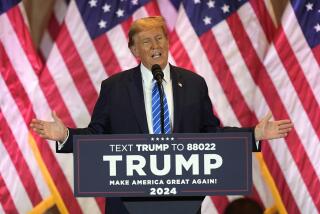Patriotism and the presidency
As the presidential campaign wends through its final days, a disturbing, discordant note has entered the vernacular of the race. After months of a spirited but serious debate about the future of the country -- about whether our common lot is best safeguarded and advanced by a thoughtful young senator from Illinois or a tough veteran from Arizona -- we now are hearing one side question whether the other is genuinely American.
Sarah Palin, in extolling the virtues of small towns, has mused about how they are “pro-America,” presumably as distinct from the anti-American parts of the nation. Even more baldly, Republican Rep. Michele Bachmann of Minnesota told MSNBC that she was “very concerned” that Barack Obama “may have anti-American views.” Although Bachmann declined interviewer Chris Matthews’ invitation to name other members of Congress who were anti-American, she ventured the opinion that the American people would welcome an expose on those members who fit the bill. She later tried to extricate herself from her own mudslinging, but her previous comments were neither forced nor misconstrued.
Setting aside the amusing spectacle of a member of Congress calling on the media to expose members of Congress (careful what you wish for, congresswoman), it is worth considering the implications of this alleged anti-Americanism. We begin with what we hope is obvious to all: There is a difference between disagreeing about how to improve this country and asserting that one side of the debate is pro-America and the other is anti-America. Honest people can and do favor John McCain’s tax policy or Obama’s approach to the economy; thoughtful women and men, Americans all, prefer Obama on the environment or McCain on Iraq. Many Americans believe that Joe Biden is a windbag or that Palin is woefully unprepared for high office. Those are expressions of a healthy American disputatiousness.
The veer into who is pro- and who is anti-America, however, is another matter altogether. Does Obama’s passing friendship with William Ayers, co-founder of the Weather Underground, constitute an act of bad judgment? Perhaps. Is it evidence of anti-Americanism? That’s where a critique becomes a smear. Similarly, Bachmann glibly tossed around her malevolence, lighting upon House Speaker Nancy Pelosi (D-San Francisco) and Senate Majority LeaderHarry Reid (D-Nev.), who, in her estimation, are liberal, leftist or anti-American -- or some combination thereof.
Neither Bachmann nor Palin invented this type of vilification. Indeed, we in Los Angeles see it all too frequently, as questions are raised about the patriotism of protesters who march for reform of U.S. citizenship laws while waving Mexican flags. There, the symbolism distracts and gives quarter to those who would demonize people whose crime is wanting to be a part of this country. Surely, though, it cannot be evidence of anti-Americanism when a person wants to become an American.
These new entries in the lexicon of patriotism represent a return to an eramost of us hoped was consigned to history-- when disagreement over policy became synonymous with disloyalty, when supporters of Social Security or Medicare were branded socialists, when those who believed in the rights of speech or association were considered radicals. Many of those who argued for their beliefs lost jobs; some went to prison.
Indeed, it is within the living memory of many of those who will vote next week that Americans were divided into the patriotic and the “un-American.” The latter made up a large group with vague contours, from spies for the Soviet Union to conscientious protesters whose words or actions penetrated the alcoholic haze of Sen. Joseph McCarthy.
The investigations of that Red Scare era did yield some disloyal citizens. It is now largely accepted, for instance, that Julius Rosenberg was a Soviet spy. But the revelations of genuine threats to national security were small next to the damage done by the Red-baiters. McCarthy and his colleagues smeared high officials and low-level government workers, dentists, teachers, writers, actors, lawyers, college presidents. They cowed others into silence with the threat of public pillory. In the words of the Supreme Court, they engaged not in legitimate inquiry but in the exercise of intimidation, yielding to the desire to “ expose for the sake of exposure.”
We are not at that tragic stage today. But it is worth remembering that much travesty preceded McCarthy’s tragedy. His ability to wound was aided by the acquiescence of many who knew better. One man who studiously refused to challenge McCarthy was President Eisenhower; he declined to confront him directly in order to deny the senator a place on the presidential stage. In the end, McCarthy was censured by the Senate and died not long after. But many suffered in the interim, falsely accused and inadequately defended on the charge of un-Americanism.
The allegations of anti-Americanism in the current campaign are just as specious as those leveled against too many in the 1950s, and they deserve the denunciation that Eisenhower was unwilling to provide. President Bush has not yet raised his voice against the false and malicious claims emanating from members of his party. He once campaigned as a uniter; now, he remains silent while others stoke division.
If the president refuses to speak on behalf of civility, then others must. In that spirit, candidates and voters should seek common appreciation for our binding patriotism.
John McCain is not The Times’ candidate of choice, but he is an American who believes in his country. So is Sarah Palin, and so are Joe Biden and Barack Obama. We who live in big cities are just as American as those from small towns; Democrats are just as committed to their country as Republicans. Those who glory in the Constitution are no less American than those who revel in the flag. However this campaign ends, it will conclude with the election of a “pro-America” president.
More to Read
A cure for the common opinion
Get thought-provoking perspectives with our weekly newsletter.
You may occasionally receive promotional content from the Los Angeles Times.






